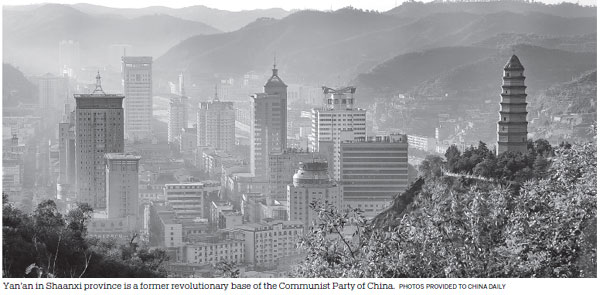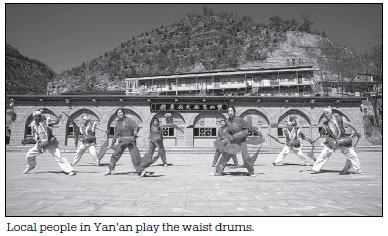Improved infrastructure, industry boosts prosperity in Yan'an
Yan'an city in Shaanxi province has become richer, trendier and more beautiful in recent years - an achievement now commemorated in the lyrics of a folk song created by Xinhua News Agency this month.
In the four decades of reform and opening-up, residents of the city in northwestern China have seen big changes in their lives, with the result that they have become more confident and prosperous, local media reported.

The aging transport infrastructure has been a factor impeding economic and social development in Yan'an. Since the 18th National Congress of the Communist Party of China in 2012, the local government has placed great emphasis on improving the infrastructure - including roads connecting small villages.
On Nov 8, 2018, Yan'an Nanniwan Airport opened, connecting passengers to 16 cities nationwide.
Xue Zhanhai, mayor of Yan'an, said: "We well leveraged the opportunities of western development, focusing on building a national comprehensive transport hub and planning several major transportation infrastructure projects.
"We've sped up building a three-dimensional transport network to completely improve the city's backward infrastructure."
Xue said the city would, by measures such as developing industries and stabilizing employment, establish a long-term mechanism that enriches local residents and ensures that poverty will never return.
In the past, all 13 counties and districts in Yan'an were located in three impoverished areas. In August 1978, Feng Senling, then a reporter from Xinhua News Agency, sent four reports to the central government to reflect farmers' poverty in northern Shaanxi.
"Many farmers in Yan'an begged for food on the streets, dressed in rags and with disheveled hair and dirty faces," Feng wrote. "We once stayed in Dongguan Canteen in Yan'an for about half an hour and saw 17 beggars, accounting for a quarter of dining customers."
In 1978, the central government offered Yan'an 10 million yuan ($1.48 million) in aid. Beginning the next year and lasting through 1987, the central government provided 50 million yuan annually to Yan'an.
After the reform and opening-up policy was adopted in 1978, the city developed fast, but the problem of food and clothing was not solved completely due to harsh natural conditions and a weak economic foundation.
In 1999, Yan'an began to transform some farmland into woodland for ecological improvement and launched large-scale ecological construction projects.
Zhang Yangang, Party secretary of Xinhu village in Yichuan county, now owns an orchard. On the mountain opposite, white poplars, weeping willows, peach blossoms and apple blossoms can be seen.
Twenty years ago, the rural economy in the county mainly depended on growing food and had low yields due to unfavorable natural conditions. Zhang said at that time, when the county government informed farmers of its intent to return the grain plots to forestry, many residents resisted, as they did not know what they could live on except growing crops.
Zhang contracted an eight-hectare slope cropland and converted it to woodland. As he got food and subsidies from governments, local people's misgivings disappeared and they began to follow suit.
In the second-round project for converting farmland to woodland, restrictions on tree varieties were lifted. To increase villagers' incomes, Zhang helped them develop the apple industry and as the foregoer, he leveled and contracted four hectares of land to plant apple trees.
In the past two years, Zhang earned about 900,000 yuan by planting apple trees and he got subsidies worth nearly 190,000 yuan under the policy of converting farmland to woodland.
To date, more than 718,000 hectares of farmland in Yan'an have been changed to woodland and the vegetation coverage reaches 81.3 percent.
Based on this, local people are developing the forestry industry, which helps increase their incomes as they raise animals such as pigs, chickens and bees in forests and develop forest tourism. Bai Zhijun, from Hantai village in Wuqi county, said his chickens can sell for as much as 120 yuan each and he can sell around 200 eggs every day, each for 1.5 yuan.
He also runs a nongjiale, or farm homestays. His net income surpassed 80,000 yuan last year.
Bai said his nongjiale is very popular during summer days due to its attractive surroundings and cool temperature and tourists especially like his chicken, eggs, vegetables and fruits. Bai said he is confident that he won't fall back into poverty.
songmengxing@chinadaily.com.cn


(China Daily 05/15/2019 page11)














